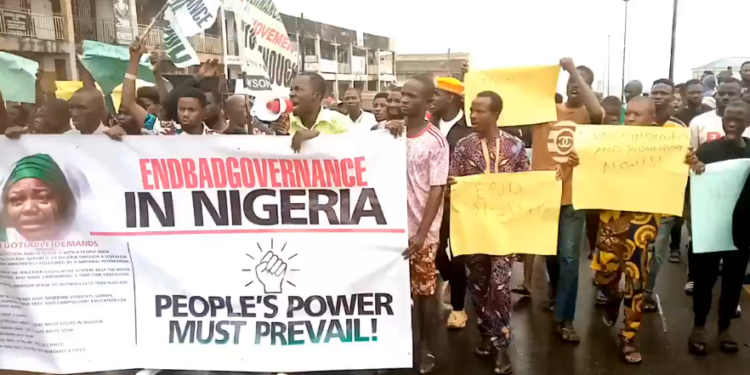Protesters across Nigerian states have taken their discontent to the streets against bad governance and the rising cost of living. The nationwide demonstration kicked off with hundreds of turnouts today and is expected to last for ten days.
Businesses and schools remain closed across major towns as residents stock up on food amid fears of the #EndSARS simulation, which took the whole world by surprise in 2020. Police had in the early mornings cordoned off critical infrastructure and roads leading up to Abuja’s Eagle Square—the organizers’ planned meeting point.
The #EndBadGovernanceinNigeria began weeks after the Finance Bill 2024 triggered massive protests across Kenya. Nigerians on social media platforms, especially X users, had successfully managed to set the timeline dubbed “10 days of outrage” to express their discontent with Tinubu’s government.
Many households in Nigeria are currently grappling with rising inflation, skyrocketing fuel prices, and the soaring prices of basic commodities. Al Jazeera reports that protest organizers had presented a list of 19 demands, including the removal of subsidies on petroleum products, suspected to be the main cause of the woos.
The continent’s most populous country is overwhelmed by unprecedented insecurity challenges, the rising cost of living and unemployment rates, poverty, poor governance, and endemic corruption in public offices.
Amid division among the northern leadership, especially the Delta People, who seem to have differed with the motive behind protests, protest organizers and the youth have demanded a constructive dialogue with the government to address the pressing issues.
The demonstrations, which seem to have gained much inspiration from the Kenyan Gen Z prostitutes, will be over by the 10th of this month. With the law turnout today and the heavy deployment of troops and police in the streets to curb the movement stretching beyond the confined zones, much is expected in the coming days as to whether more will be able to show up in the streets.
Kenya’s biweekly demonstrations lasted for more than a month. Perturbed by the outrageous protests, President Ruto backed down on the controversial finance bill.
He was, thereafter, forced to dissolve his cabinet on July 11, except for the positions of the deputy president and the minister for foreign affairs. Kenyans had accused the cabinet of too much opulence and the undocumented and reckless use of public resources.
A similar attempt to march to Parliament was made by Ugandans, but it was violently put down by the rogue police officers and troops in Kampala. Ugandans were accusing the parliament of being overly corrupt and demanding the resignation of the speaker, who’s currently facing graft cases.







